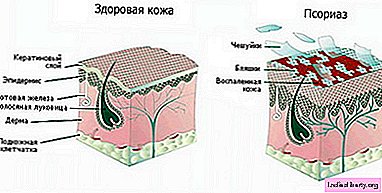
Psoriasis It is a common form of chronic dermatosis, which is characterized by the formation of flaky papular rashes on the skin. Psoriasis can affect any part of the body, however, most often it appears on the scalp, on the elbows, knees, palms, feet, and less often on the nails, soft tissues of the mouth and genitals. Between 15 and 20% of people with psoriasis suffer from joint inflammation called psoriatic arthritis.
Psoriasis - causes
Today, experts do not name the exact cause of psoriasis, however, it is believed that the development of this disease occurs due to impaired functioning of the nervous and endocrine systems, metabolic processes, especially disorders of fat and carbohydrate metabolism, foci of chronic infection, diseases and disorders of the normal functioning of the liver. It is also known that predisposition to psoriasis is hereditary.
Psoriasis - Symptoms
Psoriasis is usually manifested by dry, red spots raised above the surface of the skin (psoriatic plaques), covered with loose silver-white scales; although sometimes the disease is not accompanied by any visible skin lesions. First, psoriatic plaques appear on limited parts of the body, localizing mainly in the scalp, on the extensor surface of the elbow and knee joints, in the sacral region, etc. Plaques are clearly demarcated from healthy skin and have a bright pink or saturated red color.
Psoriasis - diagnosis
Diagnosis of psoriasis is usually not difficult, it is based on the characteristic appearance of the skin. The situation is more complicated with the differential diagnosis of arthropatic psoriasis with rheumatoid polyarthritis, especially when it is not accompanied by skin rashes. For the correct diagnosis of psoriasis, information about the presence of it in relatives is very important. Sometimes, a biopsy of the skin is performed to clarify the diagnosis of psoriasis.
Psoriasis - treatment and prevention
The treatment of psoriasis depends on the localization of its manifestations, the severity, the patient’s medical history, and the tolerability of the medicine. With a mild form of psoriasis, local treatment is performed; in the presence of a large affected surface, local treatment is supplemented with ultraviolet radiation therapy (UVA therapy). In the absence of the effect of local treatment and UVA therapy, systemic treatment is prescribed. An important part of the treatment of psoriasis is the diet, which includes limiting animal fats, carbohydrates, spicy foods, and eliminating alcohol.
In the progressive stage of psoriasis, it is advisable to use antihistamines (suprastin, tavegil, fencarol), as well as hypersensitizing agents (gluconate and calcium chloride, sodium hyposulfite, magnesium sulfate for injection), vitamins (B6, B12, A, C), sedative therapy in in the form of preparations of bromine, valerian, elenium, etc. Corticosteroid ointments are used externally.
At the stationary stage, psoriasis is treated with autohemotherapy, pyrogenal, injections of staphylococcal toxoid or antifagin (if there are foci of chronic infection), ultraviolet radiation. Externally shown is the use of keratoplastic ointments: ichthyol, sulfur-tar, naphthalan with corticosteroids. A good effect is obtained from spa treatment at hydrogen sulfide and radon sources, as well as sunbathing and sea bathing.
Severe forms of psoriasis require oral administration of corticosteroid hormones and cytotoxic immunosuppressants. Modern methods of treating psoriasis are represented by photochemotherapy, hemosorption, plasmapheresis.
Prevention of psoriasis is carried out using dispensary observation and maintenance therapy in winter and early spring.
Comments











